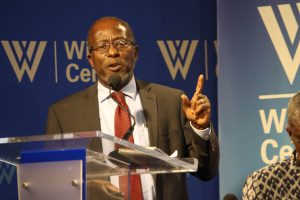In its latest flagship report, the African Center for Economic Transformation (ACET) has urged African governments to adopt a two-pronged approach to industrialization. During a recent launch of the African Transformation Report titled Agriculture Powering Africa’s Economic Transformation at the Wilson Center in Washington, Dr. Yaw Ansu, ACET’s Chief Economist and primary author of the report, proposed a two-pronged approach to industrialization, under which efforts to modernize farming would raise agricultural productivity and create linkages with other sectors of the economy, notably manufacturing.
The launch was graced by Dr. K.Y. Amoako, ACETs’ Founder and President, together with Dr. Mark Sundberg, Deputy Vice President and Chief Economist of the Millennium Challenge Corporation (MCC), and Dr. Xinshen Diao, Senior Research Fellow and Deputy Director of the Development and Strategy and Governance Division of the International Food Policy Research Institute (IFPRI).
The report zeroes in on how Africa can create within a generation a modern, competitive and environmentally sustainable agriculture sector that ensures food security, supports a middle-class lifestyle for a growing number of farmers and powers Africa’s economic transformation.
Opening the event, Dr. K.Y. Amoako shared ACET’s vision for an “economically transformed Africa within a generation.” He described ACET as “a think-and-do tank that walks the talk through rigorous research, peer-to-peer learning and getting governments to take actions based on analysis produced.”

In presenting the report, Dr. Ansu outlined ACET’s vision for agriculture and elaborated on key opportunities and challenges in transforming the agricultural sector. Access to land and security of tenure, low farm productivity, low access to input and output markets and finance and a weak value chain were among some of the challenges outlined. Yet Africa possesses close to 60% of the world’s uncultivated arable land, year-round sunshine for long growing seasons and a youthful African population, representing real opportunities for transformation, Dr Ansu pointed out.
According to Dr. Ansu, African countries have the opportunity to pursue two tracks to industrialization. The first track leverages relative labour abundance for labour-intensive and export-oriented light manufacturing. By contrast, the second track leverages advantages in African agriculture for globally competitive manufacturing based on agriculture. This he described as the two-pronged approach to industrialization, which he urged African leaders, policy makers and other stakeholders to adopt in the industrialization agenda of Africa.
IFPRI discussant, Dr. Diao, praised ACET for providing a new perspective on agriculture that offers insights into similar transformations that occurred in Asia. She noted that China’s two-track approach had trade-offs and limitations, and that it is necessary to understand the difference between the two tracks, the role of regional domestic markets, and what African countries must do to better position themselves in international markets.
For his part, Dr Sundberg observed that contrary to Dr. Amoako’s assertion that everyone is now talking about transformation, economists are still trapped in models that have been taught for over sixteen years, which advocate the pulling of labour from agriculture to manufacturing.
Key challenges preventing growth in the agricultural sector include demographics and whether agro-industry can provide a gradual path to growth, Dr. Sundberg noted. He pointed to challenges related to the transfer of technology from manufacturing to agriculture, the need for economies of scale, and the fact that manufacturing tends to expand and present more opportunities than agriculture, but emphasized the need to rethink these models and devote deeper analysis to Africa’s fractured markets and the ties between agriculture and other sectors.
The African Transformation Report 2017 has been praised by Kofi Annan, Joseph Stiglitz and other leaders in the field of economic transformation.
Click here to watch the launch webcast.



0 Comments